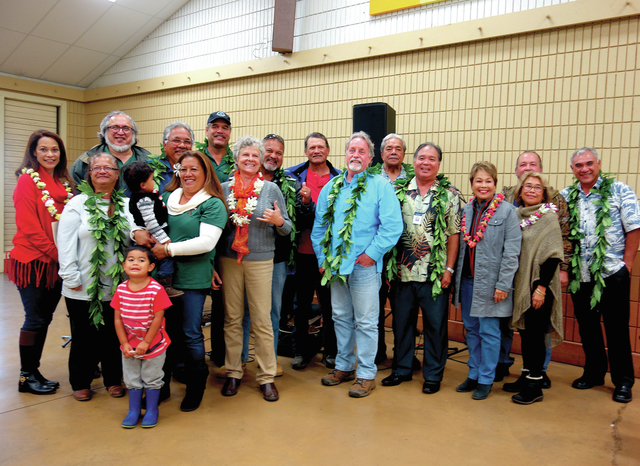WAIMEA — Not even a downpour could deter Mike Hodson from Thursday’s groundbreaking event for the Waimea Hawaiian Homesteaders’ Association’s long-awaited Waimea Nui Project. As the Association’s president and a driving force behind the 161-acre community project, he breathed a sigh of relief as things are now moving forward on what will pave the community’s future on the Home Lands in east Waimea.
“We fought and pushed for 50 years,” he said. “This has been a journey. We went through four conceptual plans and never got beyond them. Today, at the groundbreaking, we are on the verge of starting the development. It’s been an amazing six years and I expect another great 20 years. The most difficult thing is the first step, as a nonprofit, to get the funding to move forward. I’ve learned a lot in the system that we live in.”
More than 50 residents, county and state officials attended the indoor ceremony in Kuhio Hale. Sen. Lorraine Inouye; Rep. Cindy Evans; State Department of Agriculture Chairman Scott Enright; Deputy Bill Aila to DHHL Chair Jobie Masagatani, and Liaison Wilfred Okabe to Gov. David Ige, spoke at the event.
“Sitting with your board on this project, I’ve told them this is a war of attrition. You lose some battles, you win some battles but you never stop. You keep showing up,” Enright said. “That’s what it will take to fully realize all the comprehensive projects incorporated into Waimea Nui. You have the committed team and strong support. This project will be realized.”
The development has been in planning stages since 1954. In 2014, then-Gov. Neil Abercrombie released $3.5 million for the Waimea Nui. After six years of planning, on Nov. 16 the Waimea Hawaiian Homesteaders’ Association received approval of a 65-year general lease for the project made possible by the Department of Hawaiian Homelands.
“Tenacious describes Mike,” said Aila. “From a cultural standpoint, it’s in our DNA because our kupuna are buried in the aina. Nothing can be more pono than bringing life from the land. On behalf of my office, may this be a tremendously successful project, not only for Waimea or Hawaiians, but Hawaii. The small part we do is providing the land.”
The plan features community agriculture and equestrian parks, a cemetery and economic engines such as a golf course. The first phase will focus on building the road and bringing the ag water into the ag park with two 100,000-gallon water tanks to store for the east side of the 30-plus acre park, according to Hodson.
“We’ve learned a lot about procurement; of biding out jobs and what the money you thought was available to do a task didn’t go as far as we thought it would go,” he said. “We were hoping that the funding would have been sufficient for our request that included the build out of our first 100 greenhouses that would have been open for the whole community, but the bidding proposals were too high and DOA had to cut back the work to match the funding. The ag park was cut out.”
Isemoto Contracting won the bid, and construction is scheduled to begin work later this month, with an estimated completion by April. Hodson is flying to Arizona this week to see building plans presented by fourth-year architectural students at Arizona State University for nine future Waimea Nui buildings.
Waimea Nui Community Development Corporation is a nonprofit created by Waimea Hawaiian Homesteader’s Association to develop the community. According to their initiative, the goal is to create pathways toward self-sufficiency by building a community grounded in traditional Hawaiian values.
The area covers more than 27,000 acres of Homestead Lands. Roughly 40 percent of the Waimea population are of Hawaiian decent.
“I will be on the money committee,” said Inouye. “We will continue to support and make sure Waimea Nui is successful moving forward.”
Evans also spoke at the event.
“What we have here is really special, and a reflection of who we are and what we value,” she said. “The North and South Kohala district that I represent is really a small rural community with a connection to the land. In the DHHL department we support the community, and agriculture is our priority.”
Okabe, who works with the governor, has known Hodson since he was 16.
“He is a leader for his community, bringing both the state and the county together to be able to send his message for the Hawaiian people,” Okabe said. “Things don’t just happen. It’s about a value that Mike brings to the community. This is the first in the state to be able to sustain this type of concept.”
Hodson concluded, “We believe this will be a state model for other homesteads to push forward. The education that we’ve learned we will pass on to them. We don’t want to be sitting around asking for handouts, we want to take on purpose. This is our land, our people. We take on that kuleana or responsibility so we can move our people forward.”






